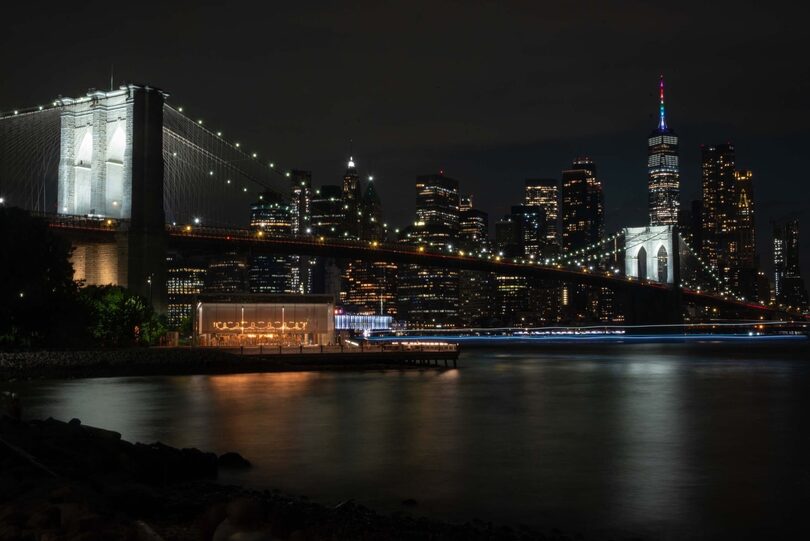Guest Column: Mamdani’s socialist plans endanger NYC’s safety, best qualities

Citing attempts at socialist policy by Venezuela, our guest columnist argues Zohran Mamdani’s promises sound compassionate but threaten NYC’s economic outlook. City-run grocers failed when Venezuela tried decades ago, he writes. Ike Wood | Asst. Photo Editor
Get the latest Syracuse news delivered right to your inbox.
Subscribe to our newsletter here.
As someone born and raised in New York City, I am the child of immigrants who believed in this city’s promise: That hard work could build the kind of future their home countries couldn’t offer.
I love this city. The rhythm and speed of the streets, the drive in its people and the belief that hard work can still get you somewhere are unmatched anywhere in the world. But lately, those of us who love New York’s promise can’t help but worry if the city that built the American dream is on the verge of a 180-degree pivot to socialism.
As Zohran Mamdani swept the Democratic primary back in June with a campaign rooted in aggressive socialist policies, I’m concerned about New York’s economic future. Mamdani is glamorizing ideas that have already proven disastrous – we can’t afford to let the capital of capitalism become the next Venezuela.
When thousands of people, especially Venezuelans, come to New York to embrace the promise of capitalism after escaping the failures of socialism, the last thing they should find is a city that has everything they’ve ever wanted to recreate the one they escaped.
At first glance, Mamdani’s economic promises may sound compassionate. City-run grocery stores, drop-in hubs and triage centers for people experiencing homelessness in subway stations, frozen rents, and a $10 billion tax plan aimed at “wealthier and whiter neighborhoods” are all mentioned as campaign aspects.
But these policies threaten the economic mentality that made New York a place of opportunity in the first place, and those who defend it simply don’t love the city as they claim.
Economists have studied rent control for decades, and the results have been remarkably consistent. Existing rent caps disincentivize developers from building new housing, which directly impacts the blue-collar working class, particularly in fields such as engineering, construction and real estate, ultimately ruining living situations for citizens.
City-run grocery stores may appear to offer a solution to rising food prices, but they contradict basic economics. Private grocery chains already operate on extremely narrow profit margins – typically between 1% and 5%.
Government-run stores would only add government inefficiency without addressing the real reasons food prices rise. Venezuela tried “state grocery stores” two decades ago, and within a few years, shelves were empty, inflation soared and people fled as corruption took over.
Mamdani has also pushed for fare-free MTA buses and expanded use of subway stations as drop-in hubs for people experiencing homelessness. Again, these ideas seem like spectacular fixes to our problems, but evidence shows that as the percentage of people paying the fares goes down, the crime on the buses increases. Making buses free doesn’t make the system equitable if it also makes it unsustainable, and 48% of bus riders already avoid fares under Mayor Eric Adams.
When thousands of people, especially Venezuelans, come to New York to embrace the promise of capitalism after escaping the failures of socialism, the last thing they should find is a city that has everything they’ve ever wanted to recreate the one they escaped.Christopher Messieha, Guest Columnist
Further, subway-related deaths inflicted by unhoused and mentally unstable people aren’t something new to New Yorkers; it’s a dark reality that occurs more frequently than it should. Turning these stations into makeshift shelters increases risk for both commuters and those in the crisis.
Many of my NYC peers have experienced moments of fear in the subways, causing us to switch train cars or isolate ourselves on the platforms. And there aren’t enough cops preventing harassment or assault– something my friends and I have witnessed firsthand. If there is anything that needs to be changed about the subway, there should be more cops on the platforms.
The subway stations aren’t a healthy living environment: they’re infested with rats and constantly flood. People experiencing homelessness deserve better treatment than that.
I love New York with my heart and soul, and I can’t imagine calling anywhere else home. I plan to live there for the rest of my life, but I worry that these socialist policies could destroy the city I grew up admiring.
I’m not speaking as an outsider looking in: I’m a college student who’s seen this firsthand my whole life. When I see rising crime, higher taxes and more government control creeping into everyday life, I worry about what kind of city I’ll be building my future in.
I’ve ridden the subway almost every day of my life, and I’ve seen firsthand how unsafe it can feel. The thought of turning subway stations into drop-in hubs makes me fear for my own safety, and one day, the safety of my family and kids. These policies have real consequences that must be recognized before it’s too late.
Mamdani plans to fund his annual $10 billion proposal with raised taxes for businesses and “richer and whiter neighborhoods.” This racial language is dangerous and shows naiveté by assuming big corporations will stay.
JPMorgan Chase, Goldman Sachs, and Citigroup have already shifted workers to Texas and Florida and have continued to do so since the pandemic. When companies leave, they take thousands of jobs and hundreds of millions of tax revenues essential for public services.
Socialism may bring compelling promises, but it always delivers scarcity. The reality is that Mamdani was born into wealth and has no idea of the repercussions of these policies. His highest level of responsibility has been managing a staff of five as a state assemblyman after a failed rap career and an internship in film, working for his mother.
New York became great because it rewarded risk and hustle, not because it punished success. We don’t need a mayor who sees entrepreneurs and those who live in “richer and whiter neighborhoods” as villains. We need leadership that understands growth and compassion aren’t opposites; they depend on each other.
Christopher Messieha is a freshman majoring in engineering. He can be reached at chmessie@syr.edu.





